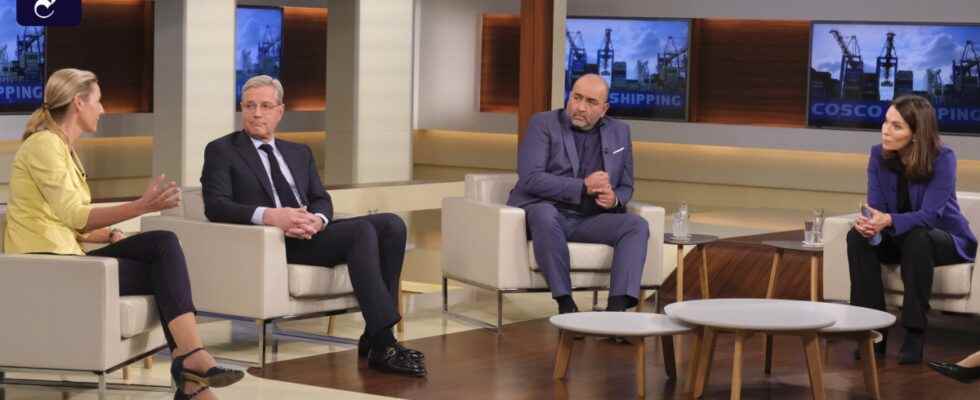Dhat you could have thought: that if Anne Will to “Anne Will” Norbert Röttgen (foreign policy expert of the CDU), Omid Nouripour (Greens boss), Stormy-Annika Mildner (foreign trade expert), Melanie Amann (from “Spiegel”) and Peter Tschentscher (SPD, First Mayor of the Free and Hanseatic City of Hamburg) and, while hanging on the question “Get out of the dependency on autocrats – how serious is Chancellor Scholz about the turning point?”, Scholzens just completed a flying visit to China and the Chinese participation in a port terminal in Hamburg are discussed, that then all attack the one, namely Tschentscher.
Tschentscher did well, but nothing more. What else could he have done, as Hamburg’s mayor and Scholzen’s successor, than to endorse the Chinese investment in a port terminal, which the Chancellor himself had largely advocated, while not failing to correct the actual dimension of this deal: It is a temporary lease with continued 100% entrepreneurial independence and ownership in general.
The other four had a relatively easy game, probably because Tschentscher doesn’t tend to be cranky or exaggerate.
Röttgen makes the best impression
Röttgen, who once again made the best impression with his analytical clarity, diagnosed a “severe failure” in current German foreign policy: disagreement within the governing coalition, within Europe – Scholz did not want to take French President Macron with him to China – and within NATO, So once again a German solo effort including a loss of confidence. All in all: a “basta solo course”.
Melanie Amann was probably right when she stated soberly that the Federal Chancellor simply (still) didn’t know how to deal with China; his speech about the “turn of the era” was not worth the paper it was written on.
Stormy-Annika Mildner played the most balanced, but by no means uncritical part that evening and criticized Scholzen’s visit to China as the wrong sign at the wrong time, but admitted that Hamburg and, it should be added, the German economy in general are in a quandary by the Chinese doing business with others if the Germans don’t want to (anymore) and suggested examining exactly what all falls under the so-called critical infrastructure.
Omid Nouripour behaved diplomatically and defended both Scholzen’s trip to China and the advice on human rights issues conspicuously given by Foreign Minister Baerbock.
Pleasant restraint
This talk evening was neither surprising nor exciting. Presenter Will seems to be moving further and further away from the interventionism to which local foreign policy, if one is to believe one or the other agitator, is only supposed to rise; but her restraint is pleasing.
As with everything else, one could endlessly discuss the relationship between realpolitik and idealism, between economic interests and human rights claims. The mutual dependencies, into which not only Germany has entered, are in any case enormous and were once wanted under the keyword “globalization” – otherwise they would not exist. And they’re not going to change anytime soon. But the longer this interdependence was discussed in order to avoid the worse word “dependencies”, the more the viewer was asked the question: What does this country, which places such great value on everything costing as little as possible, actually, apart from selling cars, all the time, in order to at least break away from one or the other dependency?
Stormy-Annika Mildner showed the way: close more and more flawless trade agreements and invest more in your own infrastructure. As you know, this can take time. The government is still busy putting together new rescue packages, distributing the money with the watering can between rich and poor, especially rich, and again and again, half-heartedly and half-heartedly trumpeting morality. But for the time being, no one in the big wide world, including in their own country, will be able to buy anything for the “value” chatter.
